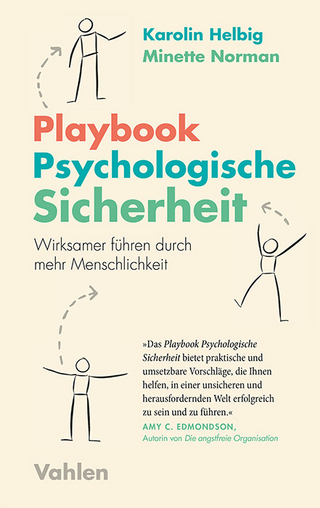
Assessing Emotional Intelligence
Springer-Verlag New York Inc.
978-1-4419-4692-8 (ISBN)
Managing human emotions plays a critical role in everyday functioning. After years of lively debate on the significance and validity of its construct, emotional intelligence (EI) has generated a robust body of theories, research studies, and measures. Assessing Emotional Intelligence: Theory, Research, and Applications strengthens this theoretical and evidence base by addressing the most recent advances and emerging possibilities in EI assessment, research, and applications.
This volume demonstrates the study and application of EI across disciplines, ranging from psychometrics and neurobiology to education and industry. Assessing Emotional Intelligence carefully critiques the key measurement issues in EI, and leading experts present EI as eminently practical and thoroughly contemporary as they offer the latest findings on:
EI instruments, including the EQ-I, MSCEIT, TEIQue, Genos Emotional Intelligence Inventory, and the Assessing Emotions Scale.
The role of EI across clinical disorders.
Training professionals and staff to apply EI in the workplace.
Relationships between EI and educational outcomes.
Uses of EI in sports psychology.
The cross-cultural relevance of EI.
As the contributors to this volume in the Springer Series on Human Exceptionality make clear, these insights and methods hold rich potential for professionals in such fields as social and personality psychology, industrial and organizational psychology, psychiatry, business, and education.
Donald Saklofske, Ph.D., is a Professor in the Division of Applied Psychology at the University of Calgary. He is also an Adjunct Professor at the University of Saskatchewan and Swinburne University, Australia. He is a Fellow of the Canadian Psychological Association and the Association for Psychological Science. Dr. Saklofske has published more than 150 journal articles and book chapters on intelligence, personality, individual differences and psychological assessment. In addition, he has written or edited books on the Wechsler intelligence scales, personality and intelligence, exceptional children, and educational psychology. He is the Editor of the Journal of Psychoeducational Assessment and the Canadian Journal of School Psychology and Associate Editor of Personality and Individual Differences. Con Stough, Ph.D., is a professor in cognitive neuroscience at Swinburne University, Australia.
Section 1: Some theoretical thoughts on EI.- A Brief Analysis of 20 Years of Emotional Intelligence: An Introduction to Assessing Emotional Intelligence: Theory, Research, and Applications.- Psychometrics and the Measurement of Emotional Intelligence.- Section 2 Research on measures of EI.- An Ability Model of Emotional Intelligence: A Rationale, Description, and Application of the Mayer Salovey Caruso Emotional Intelligence Test (MSCEIT).- Assessing Emotional Intelligence Using the Emotional Quotient Inventory (EQ-i) and Related Instruments.- Psychometric Properties of the Trait Emotional Intelligence Questionnaire (TEIQue).- The Genos Emotional Intelligence Inventory: A Measure Designed Specifically for Workplace Applications.- The Assessing Emotions Scale.- Section 3 Applying EI research.- The Importance and Training of Emotional Intelligence at Work.- Performance Based Measures and Practical Validity.- The Application of Emotional Intelligence in Industrial and Organizational Psychology.- Emotional Intelligence and Physical Health.- Emotional Intelligence and Clinical Disorders.- The Role of Emotional Intelligence in Education.- Section 4: New Directions and Conclusions.- Emotional Intelligence Across Cultures: Theoretical and Methodological Considerations.- Emotional Intelligence in Sport: Theoretical Linkages and Preliminary Empirical Relationships from Basketball.- Understanding the Neurobiology of Emotional Intelligence: A Review.- New Directions and Alternative Approaches to the Measurement of Emotional Intelligence.
| Erscheint lt. Verlag | 8.12.2010 |
|---|---|
| Reihe/Serie | The Springer Series on Human Exceptionality |
| Zusatzinfo | XII, 364 p. |
| Verlagsort | New York, NY |
| Sprache | englisch |
| Maße | 155 x 235 mm |
| Themenwelt | Geisteswissenschaften ► Psychologie ► Arbeits- und Organisationspsychologie |
| Geisteswissenschaften ► Psychologie ► Psychoanalyse / Tiefenpsychologie | |
| Medizin / Pharmazie ► Medizinische Fachgebiete ► Psychiatrie / Psychotherapie | |
| Sozialwissenschaften ► Pädagogik | |
| Wirtschaft ► Betriebswirtschaft / Management | |
| ISBN-10 | 1-4419-4692-6 / 1441946926 |
| ISBN-13 | 978-1-4419-4692-8 / 9781441946928 |
| Zustand | Neuware |
| Informationen gemäß Produktsicherheitsverordnung (GPSR) | |
| Haben Sie eine Frage zum Produkt? |
aus dem Bereich


